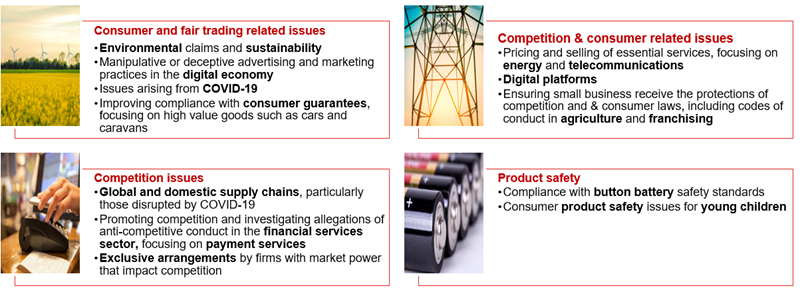This article was co-authored with Damien Vickovich.
The outgoing Chair of the Australian Competition and Consumer Commission (ACCC), Rod Sims, unveiled last week the agency’s compliance and enforcement priorities for 2022-23. For the first time, the implementation of the priorities will be aligned with the upcoming financial year, likely to account for incoming Chair Gina Cass-Gottlieb taking over the helm from 21 March 2022.
We will see a continuation of a number of the ACCC’s current areas of focus including: consumer and fair trading issues relating to the COVID-19 pandemic; the pricing and selling of essential services, such as energy and telecommunications; competition and consumer issues relating to digital platforms and the financial services sector, this year with a particular focus on payment services.
The ACCC has also revealed a number of new areas of focus including competition issues arising in global and domestic supply chains (emanating from disruptions caused by the COVID-19 pandemic), exclusive arrangements by firms with market power, as well as consumer issues relating to environmental and sustainability claims, and manipulative and deceptive practices in the digital economy.
Figure 1: 2022-23 enforcement & compliance priorities

We take a closer look at some of the key areas of ACCC focus below.
2022-23 areas of focus
Environmental claims and sustainability – as consumers pay increasing attention to the environmental impact of the goods and services they consume, the ACCC will be focusing on businesses falsely promoting ‘green’ credentials. Working closely with ASIC and the Clean Energy Regulator, investigating claims by businesses in the manufacturing and energy sectors will be a top priority.
Manipulative and deceptive practices in the digital economy – a new investigative priority for the coming year will be manipulative or deceptive advertising and marketing practices in the digital economy. The ACCC will be looking out for tactics such as ‘low stock’ warnings, false sales countdown timers, targeted advertising using consumers’ own data and the design of user interfaces which may manipulate consumer choice. This new priority continues the trend of previous actions against Trivago, for misleading manipulation of search results, and tech giants Google and Facebook concerning their use of consumers’ personal data.
Competition and consumer issues relating to digital platforms – digital platforms will remain squarely within the view of the ACCC. This follows a discussion paper the ACCC also released last week canvassing options for reforms and additional powers to tackle the market power of digital platforms, signalling concerns that Australia’s current laws, including merger laws, may not be adequate to address these issues.
Global and domestic supply chains – the ongoing impact of the pandemic on supply chains has been evident, with staff shortages, port congestion and transport interruptions being common. The ACCC’s new priority follows the recent formation of a working group between “Five Eyes”1 competition authorities in Australia, the US, Canada, New Zealand and the UK to tackle anti-competitive conduct occurring in the supply and distribution of goods in light of disruptions caused by COVID-19, with a particular focus on collusion and price-fixing.
Financial services, with a focus on payment services – the ACCC will be looking closely at payment services, in addition to its enduring focus on the financial services sector. Working collaboratively with the Council of Financial Regulators, attention is focused on issues such as de-banking, digital currency, cross-border payments, as well as competition issues in card payment markets.
Exclusive arrangements by firms with market power – the ACCC has identified a new priority for the coming year relating to exclusive arrangements by firms with market power that impact competition. The ACCC is particularly concerned about firms with market power restricting access to “bottleneck” goods or services and the impact of most favoured nation clauses that may prevent competitors from offering a better deal. The ACCC recently instituted proceedings against Peter’s for concerns about its exclusive distribution contracts which it alleges prevent rival ice cream manufacturers from accessing key distribution channels.
Consumer guarantees – motor vehicles and caravans are at the top of the non-compliant industry list for consumer guarantees this year. With consumer guarantees being the issue most commonly reported to the ACCC, it will continue to push for reforms, including making it illegal to not comply with a consumer guarantee and for a manufacturer to not indemnify a supplier that does give a consumer a remedy.
The ACCC will also continue its focus on the pricing and selling of essential services (primarily energy and telecommunications services), protecting small business (with agriculture and franchising a particular area of focus) and consumer protection issues arising from COVID-19 related travel and event cancellations.
Enduring priorities
Some conduct is considered so harmful to consumers and competition that they remain enduring priorities of the ACCC, including:
Cartel conduct – while the recent criminal cartel proceedings against various banks did not fall on the side of the ACCC, cartel enforcement remains an enduring priority for the regulator. There are currently six cartel matters before the court, along with numerous other cartel investigations underway.
Anti-competitive conduct – there are currently four anti-competitive conduct matters before the Federal Court. The ACCC has enjoyed a recent win against the CFMMEU and Hutchinson for engaging in boycott conduct. We expect otherwise the ACCC will remain eager to bring new cases under the reformed misuse of market power provisions.
Product safety – following success with the Takata Airbags recall and new safety standards being introduced for quad bikes and button batteries, the ACCC continues to advocate for product safety. In terms of reform, the regulator is pushing for a general safety provision requiring products to be safe, which does not exist in Australia but does in many OECD jurisdictions.
Infrastructure
The ACCC continues to monitor outcomes in various infrastructure sectors:
National Broadband Network (NBN) – with the network now fully built, the ACCC has turned its attention to the development of a bespoke NBN regulatory framework, with emphasis on future pricing and providing incentives for ongoing quality of service.
Regional telecommunications – in light of the findings of the 2021 Regional Telecommunications Independent Review Committee, the ACCC is focusing on improving access to mobile and internet networks in regional and remote areas.
Airlines and airports – this continues to be an important focus area given the impacts of the pandemic on travel. As airports in Australia generally enjoy monopoly market power, the ACCC will continue to target this sector in 2022.
Insurance monitoring – the ACCC intends to monitor whether the benefits of a government reinsurance pool will be realised (which aims to improve accessibility and affordability of insurance for households and small business in cyclone prone areas of Northern Australia).
Mergers
As Rod Sims comes to the end of his tenure as Chair of the ACCC, he continues to voice concerns about the effectiveness of Australia’s merger control regime. With merger and acquisition activity up significantly in 2021 on previous years, the ACCC has its eyes on potentially introducing a compulsory merger review regime. Particular sectors of focus for the regulator in 2022 were mergers in the ports, container handling equipment and services, rail transport, aviation, health and pharmaceuticals, and a recent surge in global mergers is expected to continue. Continuing the dialogue on merger reform will remain a priority for the ACCC for the coming year. What form merger reforms may take will now be shaped by the incoming ACCC chair, Gina Cass-Gottlieb, and further government consultation on the issue. No doubt the debate will continue.
With the lingering effects of COVID-19 and various sectors in the firing line, 2022-23 is shaping up to a busy year for the ACCC. We will be watching these activities closely and will update you during the year on important developments.










